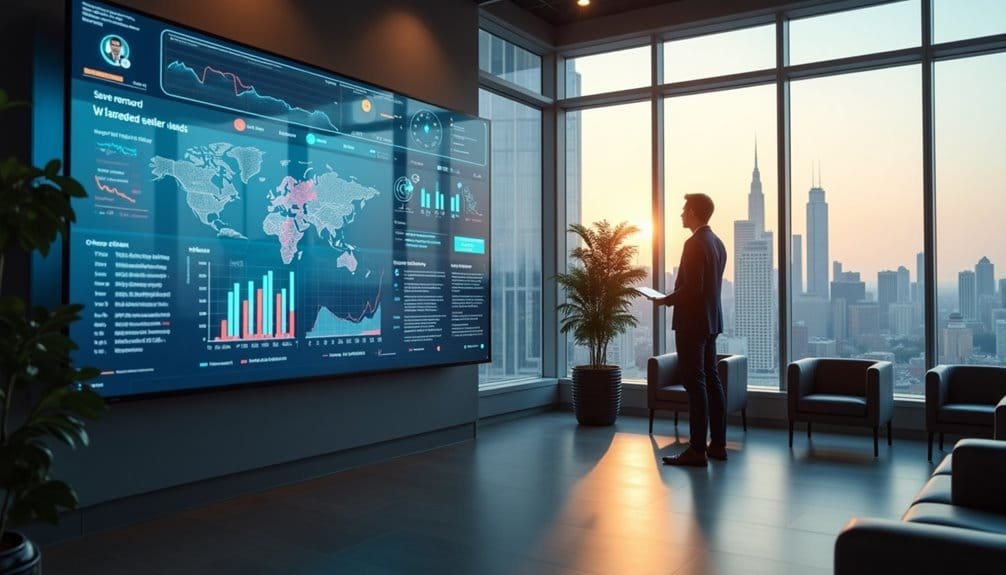To generate and convert real estate leads in 2024, leverage digital marketing and community engagement. Utilize Facebook and Google PPC to reach precise audiences, optimizing for cost-effectiveness and user engagement. Engage with potential clients on social media using quality content and interactive posts, while also utilizing AI for intelligent lead scoring and automation. Host local events to build community relationships, creating opportunities for networking and client referrals. Develop targeted email and postcard campaigns to maintain consistent contact, supported by CRM systems for effective lead management. Embracing these integrated strategies will set you on the path to successful lead conversion. Explore further insights to fine-tune your approach.
Key Takeaways
- Utilize Facebook and Google PPC for targeted ads and lead generation with optimized landing pages for real estate leads.
- Develop personalized email campaigns and direct mail strategies for effective outreach and lead conversion.
- Leverage AI tools for predictive scoring and automated lead qualification to improve conversion rates.
- Engage with local communities through events, sponsorships, and partnerships for enhanced brand visibility and lead generation.
- Use content optimization and responsive web design to attract and retain potential clients on your website.
Facebook and Google PPC

When it comes to real estate lead generation in 2024, Facebook and Google PPC are vital tools in your digital marketing arsenal. Facebook Ads offer extensive targeting options, allowing you to reach potential buyers and sellers by focusing on their interests and activities. You can tailor your ads to individuals interested in platforms like Realtor.com, Zillow, and Trulia, or those exploring topics like house hunting or first-time home buying. This precise targeting is essential for dynamic ads, optimizing your outreach to generate valuable leads. Despite the removal of some targeting options, Facebook remains a cost-effective platform, with real estate’s average CPC of $0.65 being significantly lower than that of Google Ads. With over 3.1 billion active users as of 2024, Facebook provides unparalleled reach and audience engagement potential.
To set up effective Facebook Ads, start by creating a business manager account and page. Use lead generation as your campaign objective to encourage users to fill out forms. Upload engaging media—images, videos, or carousels—that showcase properties beautifully. Pair this with compelling copy featuring strong headlines, concise descriptions, and clear calls to action. You can opt for automated ads for simplicity or manually create them for more control.
While Google PPC isn’t the main focus here, remember that keyword research and optimized landing pages are fundamental for effective lead generation. Monitoring your budget and ad performance guarantees you maximize your return on investment.
Social Media Strategies
In the sphere of real estate marketing, social media’s power can’t be overstated. When you tag local businesses in your posts, you not only increase your reach but also foster stronger community ties. By tagging relevant influencers, you open up your content to new audiences, expanding your potential client base. Demonstrating your involvement in community events by tagging them shows you’re not just selling homes, but deeply connected to the area, enhancing your credibility as a local expert. Consistently engaging with your followers by sharing polls and quizzes can further drive audience interaction.
Engagement is key. By responding to comments and messages, you build trust and credibility with your audience. Participating in online conversations and sharing behind-the-scenes content invites your followers to engage more actively with your brand. Live videos and stories further enhance real-time interaction, keeping your audience engaged and interested. On average, 95% of homebuyers conduct online searches for properties, making an active social media presence crucial for real estate professionals.
To optimize your content, focus on high-quality images and videos to showcase properties effectively. Utilize Instagram Stories and Reels to create dynamic, engaging content. Share local events and news to position yourself as a community expert. Analyze your social media metrics regularly to refine your strategies and improve your content. By adjusting your approach based on real-time analytics, you can maximize your lead generation efforts.
Targeted Seller Leads

Social media strategies have laid the groundwork for engaging potential clients, but targeted seller leads are where you can truly see your efforts pay off. Absentee owner listing leads offer a unique opportunity because these owners often face management challenges and are motivated to sell, especially if the property is a rental or a second home. Companies like The Share Group provide exclusive access to detailed information, such as the owner’s name and contact details, making it easier for you to connect with them. With the increasing trend of remote work, absentee owners are more motivated to sell due to the challenges of managing properties from afar. Many real estate agents are turning to predictive analytics platforms like SmartZip and Offrs, which utilize AI technology to predict seller behavior and maximize lead conversion.
Empty nest downsizing leads present another valuable opportunity. These are typically seniors with substantial equity from long-term ownership, keen to shift to smaller homes for a more manageable lifestyle. They’re ready to sell quickly, often overlooked by other agents, giving you an edge in this niche market.
Likely-to-sell homeowner leads are vital as they identify homeowners inclined to sell due to various personal or economic factors. Predictive analytics companies like SmartZip offer tools to pinpoint these sellers, giving you a first-mover advantage. By integrating these leads into your CRM, you can nurture them effectively, ensuring you’re ahead in tight inventory markets and ready to assist when they decide to sell.
Community and Offline Tactics
Leveraging community and offline tactics is essential for establishing a strong local presence in real estate. Hosting local events like neighborhood picnics or charity drives can help you connect with residents, showcasing your commitment to the community. Sponsorships of local charities or sports teams align your brand with meaningful causes, enhancing your visibility. Welcome new residents with personalized neighborhood packages, including letters, local business coupons, and real estate market information, creating a warm first impression. Utilizing direct mail campaigns, you can target specific neighborhoods with personalized letters or postcards highlighting recent sales or market trends. Developing community newsletters provides regular updates on local real estate and community events, keeping potential clients informed. Door knocking and distributing flyers or personalized letters introduces your services directly to homeowners, fostering personal connections. Open houses offer opportunities to engage with potential clients in person, while buyers’ seminars can generate leads and build relationships. Establishing local partnerships with businesses or joining networking groups expands your referral network, boosting lead generation. With the rise of online communities, such as BiggerPockets, agents can also network and gain valuable insights on community engagement strategies. Face-to-face interactions and active community involvement through sponsorships and events build rapport, ensuring your real estate services remain top-of-mind for local residents. By nurturing your sphere of influence, you can easily tap into a network of individuals who already know and trust you, leading to consistent referrals and commissions.
AI in Lead Generation

While community and offline tactics lay the groundwork for local engagement, AI in lead generation takes your real estate strategy into the digital frontier. Predictive scoring is one of AI’s most powerful tools, analyzing historical data to forecast which leads are most likely to convert. With AI, you gain data-driven insights that help create compelling lead magnets, attracting your ideal prospects effortlessly. Automated lead qualification becomes a breeze as AI tools assess and segment leads based on interest, financial readiness, and fit with your services.
The Leadflow AI Agent enhances market strategies by predicting homeowners likely to sell within 90-180 days, providing actionable insights for timely outreach to potential sellers. AI doesn’t stop there; it also analyzes market trends and past lead behavior to predict which prospects are ready to buy or sell. This strategic targeting allows for personalized outreach, tailoring content and messaging to resonate with different audience groups, thereby boosting engagement and conversion rates. AI-driven lead nurturing is available 24/7 through chatbots and virtual assistants, ensuring continuous engagement even after business hours. Automated follow-ups mean you never miss a lead, as AI sends personalized emails and texts timely. AI tools can also process massive datasets from various sources, identifying likely buyers and sellers based on online behavior and demographics.
Efficiency and scalability are enhanced with AI’s ability to process vast data, instantly qualifying leads, and integrating seamlessly with CRM systems. This not only streamlines workflows but gives you a competitive edge in the market.
Enhancing Client Referrals
Building a strong referral network in real estate can catapult your business to new heights. By leveraging past client relationships, you can transform satisfied clients into powerful advocates. When you directly ask for referrals and maintain consistent communication, you keep yourself top-of-mind. Offering incentives for referrals can also motivate your past clients to introduce you to their network. Here’s how you can enhance your client referral strategy:
- Utilize Existing Relationships: Happy clients are your best marketers. Stay in touch with them, share updates about your business, and show appreciation for their referrals.
- Network and Partner: Build connections with local businesses, mortgage brokers, and community groups. Engage in local events and join professional networks to increase your visibility and trust in the community.
- Communicate Effectively: Personalize your interactions, whether through email marketing, social media, or direct requests for referrals. Tailored communication keeps you memorable and approachable.
Content and Website Optimization

As you enhance your client referral strategy, focusing on content and website optimization becomes essential in capturing new leads and strengthening your online presence. Your website should offer a user-friendly interface that’s both professional and intuitive, guaranteeing visitors have a seamless experience. Detailed property listings, complete with photos and videos, can engage potential clients effectively. It’s important that your site features a responsive design, making it accessible on various devices, including smartphones and tablets. Web forms play a significant role in capturing visitor information, turning casual browsers into promising leads. Incorporating AI-driven chatbots can provide instant responses, qualifying leads efficiently.
Crafting informative content is imperative to establish authority in the real estate market. By providing market insights, tips, and industry knowledge, you can position yourself as a trusted source. Consistency is essential; regularly updating your content maintains visitor engagement and improves search engine rankings. Leverage AI-generated content to optimize engagement, and use behavioral analytics to tailor content recommendations. Optimizing for local SEO guarantees you attract local clients, boosting visibility and connection to your community. Prioritize search engine optimization to enhance visibility and draw organic leads, solidifying your online presence in the competitive real estate landscape.
- Prepare for Loan Maturities and Refinancing Waves as a Real Estate AgentIn mastering loan maturities and refinancing waves, uncover strategies every real estate agent needs to empower clients during pivotal financial transitions.
Effective Email Campaigns
Effective email campaigns are a cornerstone of successful real estate marketing. To truly harness the power of email, you need to build a robust email list, engage your audience with personalized content, and maintain consistent communication. Start by placing strategic opt-in forms prominently on your website and landing pages, ensuring they’re hard to miss. Highlight the value subscribers will receive, like exclusive listings or neighborhood guides, and offer incentives such as free home valuations or buyer’s guides. Leverage sign-up sheets at open houses to capture interested leads.
Once you have your list, segment it effectively. This allows for sending targeted content that resonates with specific buyer personas, geographic locations, or stages in the buying/selling process. Tailor your emails to each segment’s needs, using CRM tools for efficient management. Personalization is key; use the recipient’s name, incorporate high-quality images, and maintain consistent branding.
Craft compelling email content by varying your email types. Here’s how:
- Newsletters: Share industry news, market updates, and tips.
- Market Updates: Showcase local expertise with the latest listings.
- Educational Content: Offer homebuyer guides and neighborhood spotlights.
Automation helps maintain consistency, keeping you top-of-mind with potential clients.
Networking and Events

Networking and events are pivotal for expanding your real estate reach and forging valuable connections. Attending key events like Inman Connect and LeadsCon in 2024 can markedly boost your networking game. At Inman Connect, held in New York City from January 23-25, you’ll meet industry titans and explore tech innovations. Meanwhile, LeadsCon in Las Vegas, from April 8-10, focuses on cutting-edge lead generation strategies across industries. These gatherings offer prime opportunities to diversify your connections and gain insights from varied backgrounds.
To maximize your experience, engage in roundtable discussions. These sessions provide a platform for deeper insights and meaningful conversations, helping you build stronger ties with fellow professionals. Don’t forget to explore expo floors—visiting exhibitor booths and attending demos can introduce you to new tools and solutions that enhance your real estate business.
Participate in curated events like welcome receptions and activities designed for first-time attendees. These are perfect for breaking the ice and initiating conversations. Leverage technology through platforms like MeetingsHub at LeadsCon to schedule and manage meetings efficiently. By embracing these strategies, you’ll expand your network and enhance your real estate success in 2024.
Recent Posts

Top Tools for Real Estate Lead Capture and Management

The Importance of Lead Nurturing in Real Estate: Turning Prospects Into Clients
Leveraging Predictive Analytics
Predictive-analytics tools are revolutionizing lead generation in real estate by transforming vast data sets into actionable insights. By collecting data from public records, real estate trends, social media, and online search behavior, you can pinpoint homeowners likely to sell. These tools analyze fluctuations in property values and neighborhood sales, using AI to sift through countless data points from the internet and local MLS. This approach combines property, demographic, behavioral, and event data to predict potential sellers with remarkable accuracy.
Here’s how leveraging predictive analytics can benefit you:
- Target High-Quality Leads: By focusing on leads most likely to sell or buy, you can increase your conversion rates and efficiency.
- Enhance Market Positioning: Use data-driven insights to forecast trends, identify potential buyers and sellers, and set competitive prices.
- Automate Marketing: Implement targeted campaigns through emails, postcards, and digital ads, integrating with CRMs for seamless lead management.
Key providers like Smartzip, Revaluate, and Offrs offer AI-powered solutions, predicting sellers and integrating with marketing tools. These platforms automate marketing, providing home valuation landing pages and direct mail campaigns. By combining cutting-edge technology with industry expertise, you’ll achieve advanced lead generation.
Frequently Asked Questions
How Can I Use Virtual Reality for Real Estate Lead Generation?
You can use virtual reality in real estate by offering immersive property tours that potential buyers can experience from their own homes. This approach broadens market reach, allowing you to showcase properties to out-of-town clients or those needing quick decisions. Pair VR tours with social media and email marketing for greater visibility. Make sure your VR tours are accurate and engaging to convert interest into solid leads efficiently and effectively.
What Role Does Cryptocurrency Play in Real Estate Transactions?
Cryptocurrency’s role in real estate transactions is transformative. You can leverage crypto for instant payments, reducing fees and transaction times. Crypto-backed mortgages and DeFi lending offer innovative financing options, while blockchain guarantees secure, transparent deals. Platforms like RealT enable fractional ownership through tokenization, broadening investment opportunities. As regulatory support grows, adopting cryptocurrency in real estate not only diversifies portfolios but also boosts efficiency and accessibility in the global market.
How Do I Assess the ROI of a Real Estate Lead Generation Strategy?
Evaluating ROI for real estate leads is like being a detective, piecing together clues. You track KPIs, such as lead conversion rates and cost per lead, ensuring they align with your objectives. Immerse yourself in lead quality: focus on high-intent prospects, and use feedback to refine strategies. Regularly review your performance, benchmark against industry standards, and adjust accordingly. Remember, continuous optimization through A/B testing and leveraging AI tools is key to success.
What Are the Legal Considerations for Using AI in Real Estate Marketing?
When using AI in real estate marketing, you’ve got to guarantee compliance with data protection laws like GDPR and CCPA. Address liability concerns to prevent misinformation, and protect consumer interests. Be aware of intellectual property rights to avoid infringement. Design AI algorithms to adhere to fair housing laws, preventing discriminatory practices. Implement robust data security measures, guaranteeing client information is protected and regulatory standards are met, maintaining trust and integrity in your marketing efforts.
How Can I Leverage Influencer Partnerships to Boost Real Estate Leads?
When it comes to real estate, “a picture is worth a thousand words.” Partner with influencers who resonate with your market to boost lead generation. Choose influencers with a strong local presence and high engagement rates, ensuring their content aligns with your brand. Collaborate on property tours, market insights, and exclusive listings. Track engagement metrics and conversion rates, and don’t forget to analyze ROI regularly to refine your strategy.
Bottom Line
In 2024, you can capture and convert real estate leads by combining cutting-edge technology and community-centric strategies. Prioritize precise PPC campaigns on Facebook and Google, harness social media’s strength, and engage with your community offline. Use AI and predictive analytics to enhance targeting, while optimizing content and websites for seamless user experience. Craft compelling email campaigns, and don’t underestimate the power of networking and events. By blending these approaches, you’ll boost your business and build lasting connections.







